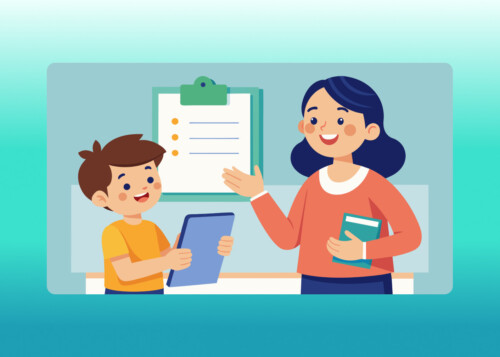Parent-teacher conferences allow teachers to connect with families and exchange valuable information and updates on the student’s learning and progress.
We have some tips for teachers to avoid common pitfalls and get everyone excited about conferences!
Parent-teacher Conference Tip 1:
Start Preparing Data and Showcased Student Work
Keep the parent-teacher conferences in your mind from the very first weeks of school. If your school is big on data collection, gather supplies to keep a data notebook at the beginning of the year. If your school is more portfolio-driven, start collecting student work samples early and continue to save at least a piece a week to demonstrate progress toward learning goals. Take photographs (if your school allows) of students’ learning in action, write down the date and a description, and add these to their portfolios for a more personal touch.
Creating a basic schedule for updating your data/portfolios can help you avoid procrastination. Letting all of your work fall on the week before conferences is not only stressful, but it typically means you won’t be able to provide as thorough of a picture to families as you could with a little more prep time.
Parent-teacher Conference Tip 2: Invite Parents Early
One of the most crucial parent-teacher conference-planning steps is informing families of conference dates as soon as possible. Most schools know when conferences will be held before the school year even begins, and communicating this to families early enables them to reserve that time in their calendars, take time off work, and arrange childcare. About a month out, teachers can remind parents about conferences via their class newsletter or communication app, and schools can share a flyer by email or on the school’s media pages.
To get everyone involved, let children create or decorate a handwritten invitation to parent-teacher conferences to take home the week off. The hand-crafted invitation serves as an authentic writing exercise for students and communicates to them just how important conferences are!
Parent-teacher Conference Tip 3: Keep Interpretation Needs In Mind
If you have a class with many bilingual families, check to see if they will need an interpreter for conferences. Doing this early on ensures that the interpreters, teachers, and families can coordinate to create a schedule that works for everyone. This also gives you time to reach out to any translation services your school district might offer, like translating documents guardians need to sign or copies of assessment data for families to take home.
Some districts make video or phone interpreting services available to teachers. On the evening of the conference, you simply call into the service, tell them what language you need to be interpreted, and they connect you with a translator. The best practice is to continue speaking as you would to the parent rather than to the interpreter. It’s still a conversation between you!
Another interpreting service to consider is ASL interpreters. School districts employ interpreters in their special education departments and should provide interpreting services to students or family members who are deaf or hard of hearing. If not, there might also be a video interpretation service you can use instead.
An important note: relying on students or their siblings to interpret for you is not good practice. If your school lacks interpreting services, connect with your ELL teachers, other adult family members, or a telephone translation app. Letting a child serve as your interpreter should be your very last resort.
Parent-teacher Conference Tip 4: Build a Sense of Community Around Conferences
Create a community-building atmosphere around conferences by arranging for a meal to be provided to families and teachers who are in attendance. Consult with your school’s PTO to see if they have funding to cover this expense, or reach out to local restaurants for a donation beforehand. If you’re feeling extra social, make it a potluck! During your mealtime, you might have tables set up with information on upcoming school events, a sign-up table for your school’s PTO, or meet-and-greets with club and after-school program leaders.
Parent-teacher Conference Tip 5: Provide Childcare
For many parents, childcare can be prohibitive for conference attendance. Consider having volunteers from the PTO or other school staff watch students or siblings in the gym or playground during conferences. That way, parents can give you their undivided attention.
Parent-teacher Conference Tip 6: Pre-prepare Information Packets
Let’s be realistic–conferences are quick, and not everything can be covered in that 20-minute conversation. Having pre-prepared packets with copies of students’ assessment data, forms that need signatures, etc., can help keep the conversation focused on students’ needs and progress. If you’re extra organized, you might even send home packets before conferences. That way, parents can review the information and come back with any questions.
Parent-teacher Conference Tip 7: Include Student’s Specials Teachers
We know that, for some students, the draw to school may not be from their academic day. And that’s okay! Students might have a particular interest in art, languages, orchestra, choir, or physical education. Because of this, it’s important to involve your specials teachers in conferences. These teachers can welcome students into their classrooms or set up tables in a central location, like the gym or front hallway. That way, parents can meet and chat with the other influential adults in their children’s lives. They might even be surprised to learn that their child is especially talented in the arts or athletics and encourage them to grow those gifts!
Parent-teacher Conference Tip 8: Consider the Benefits of Student-led Conferences
One final area to consider is your conference style. While traditional conferences involve parents and teachers talking with little student input, a new trend of hosting “student-led conferences” has emerged in the past few years. If you’re unfamiliar with this concept, student-led conferences involve students taking their parents through their classroom, pausing to demonstrate skills at centers, sharing work samples in their portfolios, or sharing assessment data and what it means. If student-led conferences seem like something your school would be interested in, this article from Edutopia has a cornucopia of resources you need to put this change into action.
Parent-teacher Conference Tip 9: Gather Feedback After the Conference
After the conferences are over, why not ask parents about their conference experience? A school may create an anonymous poll to gather feedback. Hearing directly from parents will help improve the conference experience for the following year for both teachers and parents and increase attendance rates.
- Happy Outside: How to Safely Enjoy Outdoor Play In Winter - January 9, 2025
- The Power and Benefits of Outdoor Play and Exploration - January 6, 2025
- How to Connect with Families Experiencing Homelessness - December 19, 2024





